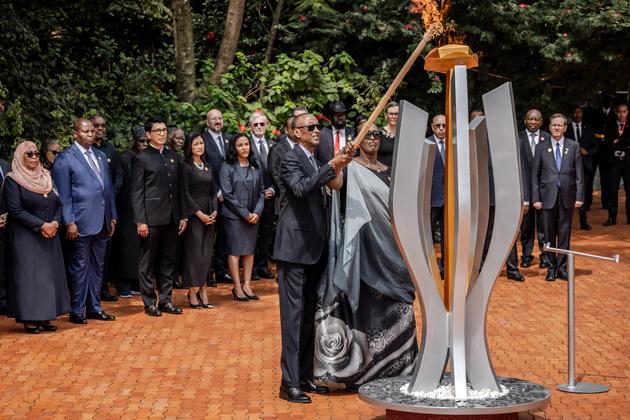The years go by, but the ritual remains the same. On April 7, 30 years to the day after the outbreak of the genocide against the Tutsis in Rwanda, Paul Kagame rekindled the flame of remembrance at the Gisozi Genocide Memorial, where lie the remains of 250,000 of the 800,000 men, women and children who were methodically massacred over a hundred days in 1994.

During the genocide, "it was the international community which failed all of us, whether from contempt or cowardice," stated the Rwandan president a few hours later before an audience of high-profile figures, including former presidents Bill Clinton and Nicolas Sarkozy, African Union President Moussa Faki Mahamat, and numerous African heads of state. All of them are accountable for the complicit passivity shown by several countries, foremost among them France.
These are countries from which Kagame demands more accountability, particularly those for which he has become an essential partner. Over 30 years under his inflexible rule, Rwanda has undergone a metamorphosis. From a structurally bankrupt, impoverished nation, ravaged by the worst acts of barbarism a population has endured since the Holocaust, Rwanda is now a model on the continent. It is stable, secure and poor, but anchored in a process of planned development.
'Chaos'
At what price? For several months, Le Monde, Forbidden Stories and a consortium of international media outlets have been investigating the dark side of the Rwandan regime, a special partner of many Western countries. It's a country whose name appears on the jerseys of Paris Saint-Germain football club, but which monitors and hunts down all dissident voices, even abroad, thanks in particular to spyware. It's a country that has made itself indispensable to United Nations missions in Africa but plays a key role in the war raging in the eastern Democratic Republic of Congo (DRC) by actively supporting a rebel movement, at the cost of deaths, hundreds of thousands of displaced persons and one of the world's most serious humanitarian crises.
"Rwanda Classified," an investigation into Paul Kagame's regime, involves 50 journalists from 17 media outlets in 11 countries, coordinated by the Forbidden Stories journalism non-profit. Starting with the suspicious death of journalist John Williams Ntwali in Kigali in January 2023, the investigation aims to reveal the repressive machinery implemented by Rwanda, including beyond its borders, far from the image of a model country promoted abroad. The July 15 Rwandan presidential race is likely to lead to the re-election of Paul Kagame for a fourth term.
Rwanda is so fascinating because one man embodies this metamorphosis: Kagame, a singular president with the false airs of a warrior monk, sullen and quarrelsome, the child of a tragically complex history of which he does not intend to remain a prisoner but, on the contrary, to write the course, without challenge or protest.

On July 15, Rwandans will go to the polls for a presidential election that is a foregone conclusion. In 2000, Kagame was elected by Parliament. But, since the introduction of universal suffrage, his worst electoral score dates back to 2010: 93% of the vote, with a turnout of 88%. The following time, in 2017, the bar was raised to 98.63%. It's hard to imagine another scenario in 2024. A constitutional revision adopted by referendum in 2015 (with 98% of the vote) did lower the presidential term of office from seven to five years. But, in a timely legislative move, this revision wiped out all the terms Kagame had accomplished up to that point. He can remain in power for two further five-year terms, until 2034.
You have 80.71% of this article left to read. The rest is for subscribers only.